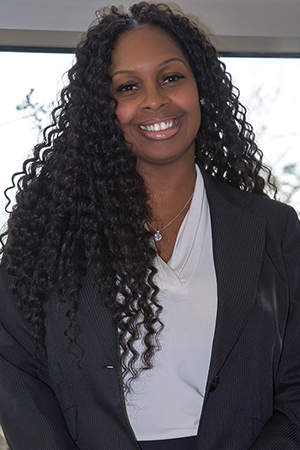February 2, 2024
By Ian Sargent
Black History Month is a time to celebrate the contributions of Black individuals throughout history, honoring their resilience, achievements, and enduring legacies. At the George W. Woodruff School of Mechanical Engineering, this month holds particular significance, not only as a time to commemorate the past but also to champion the successes of the members of the Woodruff School community.
We asked Tameka Womack, who serves as the Operations and Program Manager for the Nuclear and Radiological Engineering and Medical Physics program, to share some of her triumphs and successes, and how early aspirations to leave a positive impact on future generations have shaped her ongoing commitment to higher education.
Can you tell us a little about yourself? Where are you from originally and what’s your role at the Woodruff School?
Allow me to share a bit about myself. I am Tameka Womack and I hail from the vibrant state of New Jersey and made the transition to Georgia approximately five years ago. Before my move, I accumulated valuable experience in both industry and higher education institutions. Presently, I proudly serve as the Operations and Program Manager for the Nuclear and Radiological Engineering and Medical Physics program at the Woodruff School. It's a role that combines my passion for efficient operations and my commitment to advancing cutting-edge technologies in the field.
What drew you to working in higher education?
What sparked my interest in higher education was a lifelong aspiration to make a positive impact on the upcoming generation. Even as a child, I envisioned myself becoming a teacher or a figure in academia. However, what truly captivated me about working in higher education is the perpetual opportunity to engage in research, continually learn, and develop innovative solutions to problems through dedicated exploration and inquiry.
Why did you want to pursue a STEM education?
My passion for engineering is the driving force behind my pursuit of a STEM education. The allure lies in the satisfaction of knowing that concrete solutions exist for challenging problems. Through a STEM education, I am equipped with the knowledge to address intricate issues related to the technological advancement that directly impacts people's daily lives. It's the tangible impact and transformative potential within STEM subjects that continually fuel my enthusiasm for this field.
Who are some of your inspirations and mentors? Can you tell us about an early experience that influenced you personally or professionally?
When reflecting on my inspirations and mentors, I draw inspiration from remarkable individuals, with a special emphasis on influential women such as my mother, and trailblazing inventors like Dr. Cynthia Breazeal, Juliana Rotich, and Gladys West.
One pivotal experience that significantly influenced both my personal and professional trajectory occurred during my high school years. I had the privilege of participating in an internship with NASA, where I had the opportunity to collaborate with brilliant minds working towards a solution for ensuring sufficient air supply for potential Mars travel. Engaging in experiments with plants and exploring various methods to sustain air within a confined space left a lasting impact on me, solidifying my determination to pursue a career in STEM.
Have there been personal and professional obstacles you have faced, and if so, how have you overcome them?
In the journey of life, obstacles are inevitable, regardless of one's station. Personally, one significant challenge I encountered was at the age of 20 when I assumed the role of a Regional Engineering Director overseeing three manufacturing plants at a Fortune 500 company. The weight of such responsibility was unprecedented for me, and I faced the obstacle of effective communication with both peers and staff. To overcome this, I took a proactive approach by seeking input from my team on how to enhance their work environment and soliciting advice from my managers on improving my communication skills. Acting on their recommendations, I joined a Toastmasters group, where I gleaned valuable insights and techniques that proved instrumental in overcoming my communication challenges and fostering effective leadership.
How can we continue to champion the importance of diversity at Georgia Tech and in our personal lives?
Georgia Tech has commendably championed diversity, yet fostering its continual importance requires a collective effort from all individuals, not solely leadership. To promote ongoing diversity, we should strive to create strategic engagement opportunities for staff, fostering an environment where they can not only learn about but also deeply appreciate each other's cultures. Cultivating this mutual understanding can break down barriers stemming from differences in culture, social upbringing, or educational background. By collectively embracing diversity, we contribute to a richer, more inclusive community both at Georgia Tech and in our personal lives.

